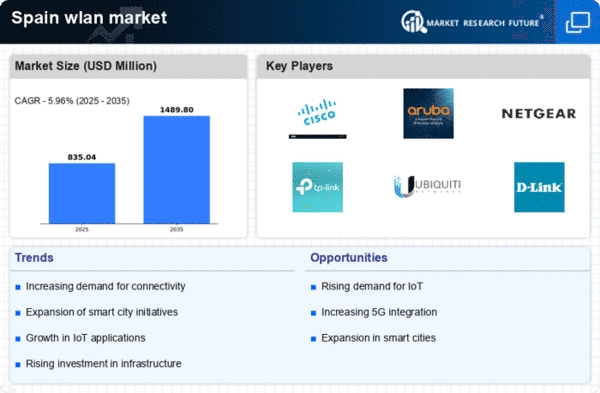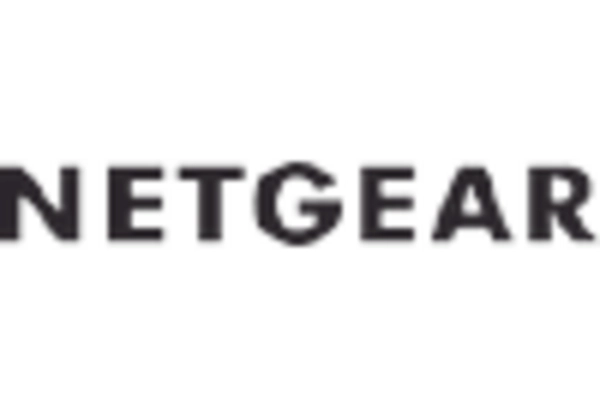Growth of Smart Cities
The development of smart cities in Spain is significantly influencing the wlan market. As urban areas increasingly adopt smart technologies, the demand for seamless wireless connectivity becomes paramount. Initiatives aimed at enhancing urban living through IoT devices, smart traffic management, and public safety systems require reliable wlan solutions. The Spanish government has allocated approximately €1 billion for smart city projects, which is expected to drive the adoption of advanced wlan technologies. This investment not only supports the infrastructure needed for smart devices but also encourages private sector participation in the wlan market. Consequently, the integration of smart technologies into urban planning is likely to create new opportunities for wlan providers, fostering innovation and competition.
Increased Focus on Data Privacy
The heightened focus on data privacy and security in Spain is shaping the wlan market. With the implementation of stringent regulations such as the General Data Protection Regulation (GDPR), businesses are increasingly prioritizing secure wireless solutions. This regulatory environment compels organizations to invest in advanced wlan technologies that offer robust encryption and security features. As a result, the demand for secure wlan solutions is expected to rise, with companies seeking to protect sensitive customer data and maintain compliance with legal requirements. The wlan market is likely to witness growth as businesses adopt more sophisticated security measures, including the use of VPNs and firewalls in their wireless networks. This trend not only enhances consumer trust but also positions companies favorably in a competitive landscape.
Emergence of Remote Work Culture
The emergence of a remote work culture in Spain is a pivotal driver for the wlan market. As organizations adapt to flexible work arrangements, the need for reliable and high-speed wireless connectivity has become increasingly apparent. Many companies are investing in wlan solutions to support their remote workforce, ensuring that employees can access company resources securely from various locations. This shift is likely to result in a significant increase in wlan installations in both residential and commercial settings. Furthermore, the demand for cloud-based applications and collaboration tools is expected to drive the need for enhanced wlan performance. As businesses continue to embrace remote work, the wlan market is poised for growth, with providers offering tailored solutions to meet the specific needs of remote teams.
Rising Mobile Device Penetration
The rapid increase in mobile device penetration in Spain is a significant factor propelling the wlan market. As of November 2025, mobile device usage is estimated to reach 85% of the population, leading to a heightened demand for wireless connectivity solutions. This trend indicates that consumers are increasingly relying on mobile devices for various activities, including online shopping, social media, and streaming services. Consequently, businesses are compelled to enhance their wlan infrastructure to accommodate the growing number of connected devices. The wlan market is likely to see a surge in demand for high-capacity access points and routers that can support multiple simultaneous connections, ensuring a seamless user experience. This shift towards mobile connectivity may also drive innovation in wlan technologies, as providers seek to meet the evolving needs of consumers.
Expansion of Internet Infrastructure
The ongoing expansion of internet infrastructure in Spain is a crucial driver for the wlan market. With the government investing heavily in broadband initiatives, the number of households with internet access is projected to reach 95% by 2026. This increased connectivity fosters a greater demand for wireless local area networks, as consumers and businesses alike seek reliable and high-speed internet solutions. The wlan market in Spain is likely to benefit from this trend, as more users require robust wireless solutions to support their online activities. Furthermore, the rise of remote work and digital services necessitates enhanced wireless connectivity, which could lead to a surge in wlan installations across various sectors, including education, healthcare, and retail.
















